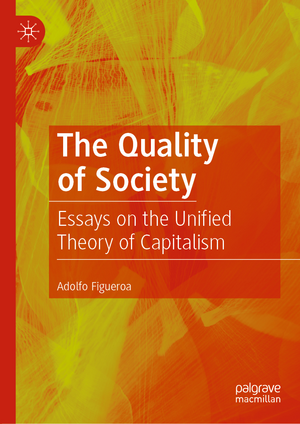The Quality of Society: Essays on the Unified Theory of Capitalism
Autor Adolfo Figueroaen Limba Engleză Hardback – 5 feb 2019
This book elaborates on the implications of the unified theory for both the science of economics and for public policies. In particular, this book develops in more detail the policy implications, discussing the fundamental economic and societal policy issues of our time—employment, inequality, the environment, and quality of life—in empirical terms.
Preț: 643.84 lei
Preț vechi: 757.46 lei
-15% Nou
Puncte Express: 966
Preț estimativ în valută:
123.20€ • 134.24$ • 103.81£
123.20€ • 134.24$ • 103.81£
Carte tipărită la comandă
Livrare economică 23 aprilie-07 mai
Preluare comenzi: 021 569.72.76
Specificații
ISBN-13: 9783030116552
ISBN-10: 3030116557
Pagini: 289
Ilustrații: XIII, 289 p. 3 illus.
Dimensiuni: 148 x 210 mm
Greutate: 0.51 kg
Ediția:1st ed. 2019
Editura: Springer International Publishing
Colecția Palgrave Macmillan
Locul publicării:Cham, Switzerland
ISBN-10: 3030116557
Pagini: 289
Ilustrații: XIII, 289 p. 3 illus.
Dimensiuni: 148 x 210 mm
Greutate: 0.51 kg
Ediția:1st ed. 2019
Editura: Springer International Publishing
Colecția Palgrave Macmillan
Locul publicării:Cham, Switzerland
Cuprins
1. Introduction.- 2. Unified Theory of Capitalism: An Overview.- 3. Science is Epistemology.- 4. Path Dependence and the Economic Process.- 5. Population and the Quality of Society.- 6. Unified Theory of Capitalism and Bio-economics.- 7. Individualism in the Anthropocene Age.- 8. Science-Based Public Policies.- 9. Redistribution through Labor Markets.- 10. Epilogue: Old and New Economics.
Notă biografică
Adolfo Figueroa is Professor Emeritus of Economics at Pontifical Catholic University of Peru. He is the author of three previous books with Palgrave Macmillan: Growth, Employment, Inequality, and the Environment (2015); Rules for Scientific Research in Economics (2016); and Economics of the Anthropocene Age (2017).
Textul de pe ultima copertă
This book explores the policy implications of the unified theory of capitalism—how economic growth has led to a new epoch, the Anthropocene, and it presents a new set of economic principles that are needed in this new age. The unified theory of capitalism has been published as a new scientific endeavor, attempting to present new economics for the Anthropocene age that are empirically verifiable and fully consistent with the physical sciences.
This book elaborates on the implications of the unified theory for both the science of economics and for public policies. In particular, this book develops in more detail the policy implications, discussing the fundamental economic and societal policy issues of our time—employment, inequality, the environment, and quality of life—in empirical terms.
This book elaborates on the implications of the unified theory for both the science of economics and for public policies. In particular, this book develops in more detail the policy implications, discussing the fundamental economic and societal policy issues of our time—employment, inequality, the environment, and quality of life—in empirical terms.
Caracteristici
Constructs a general economic theory of contemporary world capitalism that goes beyond mainstream neoclassical and Keynesian theory by insisting that economic theory should be fully scientific Directly addresses the pressing issues of our day and offers policies based on scientific theory to remedy them Examines the links between economic growth, income inequality, democracy, and degradation of the environment
